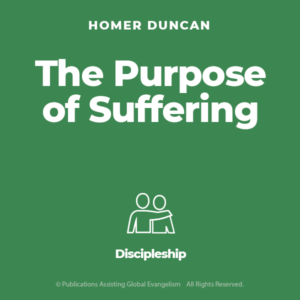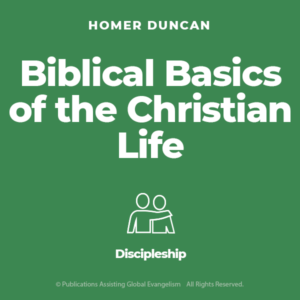Discipleship
BIBLICAL BASICS (of the Christian Life)
By Homer Duncan
Missionary Crusader
- We are saved by receiving the Lord Jesus Christ.
- We live the Christian life by letting Christ live His life through us.
- We stay in fellowship with God by confessing our sins to Him.
- We are filled with the Holy Spirit when we are controlled by the Spirit.
- We are to be rooted and grounded in the written Word of God.
- We must pray if we are to have a vital relationship with God.
- We must take our place with other believers in a local Bible-believing Church.
- The life that we have must be shared with others, at home and abroad.
- When we are rightly related to Christ, rivers of living water will flow from our inmost being.
I. SALVATION IS IN CHRIST
Most professing Christians and even many born-again Christians have a very hazy conception of salvation. Many people think that they are saved “by living right.” Others think that they are saved when they join the church. Some believe that they become Christians by following the example of Jesus. If each of these ideas is a false conception of salvation, what is the right conception? Why do we need to be saved? What are we saved from? What are we saved to?
Jesus told the adulterous woman, “Thy faith hath saved thee, go in peace” (Luke 7:50). Paul told the Philippian jailer, “Believe on the Lord Jesus Christ, and thou shalt be saved” (Acts 16:31). Paul wrote to the Church at Rome, “For I am not ashamed of the Gospel of Christ: for it is the power of God unto salvation to every one that believeth” (Rom. 1:16). The writer of the book of Hebrews exclaims, “How shall we escape if we neglect so great salvation?” (Heb. 2:3).
Salvation is not in the way that we live; it is not in what we do or in what we do not do; it is not in a Church, in a creed, in ordinances, or in doctrines, but in a Person-the Lord Jesus Christ. “God has given unto us eternal life, and this life is in His Son” (1 John 5:11). “He that hath the Son hath life” (1 John 5:12). “Thou shall call His Name Jesus: for He shall save His people from their sins” (Matt. 1:21). “In Him was life” (John 1:4). “I am come that they might have life and that they might have it more abundantly” (John 10:10).
The great truth that life is in Christ is so obvious that you may wonder why we emphasize it in this way, but the sad fact remains that many who take the name of Christ do not understand that life is in Christ. For many years, even though I was a good fundamental preacher, I did not understand this myself. I spoke of a plan of salvation rather than the Person of salvation. I preached that we were saved by believing the Gospel, and of course, in one sense this is true, but it is important to realize that the one who actually saves us is Jesus, not ourselves. We are not supported by leaning, but by leaning on something solid that will support us. It is not faith or believing that saved us, but it is faith in Christ. It is depending on Him!
Many well-meaning people believe that we are saved by what we do. Any personal worker will tell you that he frequently gets the answer, “It does not matter what church you belong to, for we are all working for the same place.” Others say, “It all depends on how you live.” Many fundamental Bible teachers and preachers put an undue emphasis on salvation by believing right doctrine. Doctrine is good, necessary, vital, and of great importance, but doctrine will never give life. We are not saved by knowing doctrine in our head, but by believing in Christ with our heart (Acts 8:37; Rom. 10:9, 10). The airline schedule may say that my plane leaves Lubbock at 8:30 a.m.; that I will get to Dallas at 9:30 a.m.; that I will get to Chicago at 11:00 a.m., and that I will get to New York at 1:00 p.m., but just believing the time table will never get me from Lubbock to New York. I must get on the plane! In the same way, we can believe everything in the Bible from Genesis to Revelation, but if we are not in Christ, we will die and go to Hell. The bones in our body are good, vital and necessary, but they do not give us life. “The life is in the blood” (Lev. 17:14). Salvation is not in doctrine but in Christ.
THE THREE TENSES OF SALVATION
In the past, we were saved from the guilt and penalty of sin the very moment we exercised saving faith in Christ. In the present, we are saved from the power and dominion of sin as we learn to let Christ live His life through us. In the future, we will be saved from the presence of sin either by physical death or through the rapture.
In the past, we were made a child of God through faith as we received the Lord Jesus Christ. At the present time, we are to be conformed to the image of Christ; we are to grow up unto the measure of the stature of the fullness of Christ. We do this as we learn to walk in the Spirit. In the future, we shall be made like Christ the very moment we see Him.
Salvation is far more than having our sins forgiven. It is more than escaping Hell and gaining Heaven. It is more than regeneration. The New Birth is not the end of salvation but the beginning of it. The New Testament teaches that at least sixty things happen to us the very moment we exercised saving faith in Christ. To many, the Christian life is the difficult task of trying to live right, or of trying to live in such a way that they will go to Heaven when they die. This is sham Christianity, and it is sheer drudgery! The Christian life brings joy and satisfaction when we discover that Christ is our life (Col. 3:4). It is a thrilling adventure to discover our possessions and to begin to possess them.
II. THE JUST SHALL LIVE BY FAITH
The most important lesson for any Christian to learn is that salvation is found in Jesus Christ. The second great lesson for us to learn is that we live the Christian life by letting Christ live His life through us. It is not a matter of seeking to follow the example of Christ, or of seeking to live according to the teachings of God’s word, but of letting the Lord Jesus who now lives in our heart live His life through us. We do not live the Christian life by trying, but by trusting. Just as we were justified by an act of faith, now we are to live in a constant attitude of faith. We were justified by believing that Christ died for our sins, and that He was buried and that He rose again. We live by faith as we look to the Christ who lives within us, trusting Him to live His life through us.
The sinner does not exercise saving faith in Christ until he is brought to the end of his own resources. As long as he thinks that he can be saved through religious activity, or through churchanity, or by living right, or by keeping the law, or by being baptized, or by anything else, he will not trust Christ to save him, but when he discovers that none of these things can save him and that there is nothing that he can do to save himself, he looks away from himself and his own efforts and looks to Christ and believes in Him for salvation. In that moment he is saved, justified, declared righteous. He is born again by the Spirit of God; he is indwelt by the Spirit of God; he is baptized by the Spirit into the body of Christ; he is sealed by the Spirit until the day of redemption. These are just a few of the sixty things that happen to a person when he exercises saving faith in Christ. In the same way, as long as the Christian thinks that he can live the Christian life in his own strength, he will try to do so. As long as he compares himself with other Christians, and thinks that he is doing wonderfully well, he will never know the true meaning of the Christian life, but when the Christian discovers his own bankruptcy, when he discovers his own inability to live the Christian life, when he sees his own depravity, then he will begin to look away from himself and will look to Christ, and he will begin to learn to live by faith (Habakkuk 2:4; Rom. 1:17; Gal. 3:11; Heb. 10:38).
III. FELLOWSHIP WITH GOD
In physical life, if we are to be well and strong, we must keep our bodies clean and free from sickness and disease. So, also in the Christian life, if we are to grow in grace, if we are to be victorious, if we are to be fruitful, we must keep our lives clean and free from all known sin. Sin is a disease that mars our fellowship with God. As believers in Christ, when we sin we do not lose our sonship, but we do lose our fellowship. We do not lose our salvation but we do lose the joy of salvation (Ps. 51:12). We do not lose our union with Christ but we do lose our communion and fellowship with Him. We do not lose the Holy Spirit (Eph. 4:30), but we do lose the power of the Spirit.
When we overload a circuit in our house, the lights go out. We have to put in a new fuse or throw the switch on the circuit breaker so that the lights will come on again. The Bible teaches us that the Christian is restored to fellowship with God when he confesses his sins to God. “If we confess our sins, He is faithful and just to forgive us our sins, and to cleanse us from all unrighteousness” (1 John 1:9). The Apostle John writes to the family of God as follows: “My little children, these things write I unto you that ye sin not. And if any man sin . . . ” What happens? What happens to the born-again Christian when he sins? Many believe that he is lost and must be saved all over again. They tell us the Christian is lost and condemned to hell when he commits the slightest sin, and that he must be saved over and over again every time he sins. But the Bible tells us that if a man could sin and fall away and be lost it would be impossible to renew him again to repentance (Heb. 6:6). What does the rest of 1 John 2:1 say? “And if any man sin, we have an advocate with the Father, Jesus Christ the righteous.” Jesus did not die to condemn us, but He ever lives to intercede for us.
When we sin, we grieve the Holy Spirit and lose His power, but we do not lose the Holy Spirit, for we have been sealed by the Spirit until the day of redemption (Eph. 4:30). Many Christians who are truly born again are not in fellowship with God. Therefore, their lives are filled with bleakness and barrenness. They do not experience the peace that passeth understanding. Of all men they are the most miserable, for having been saved, they cannot enjoy the things of the world, and because they are out of fellowship with God, they cannot enjoy the things of God.
Fellowship with God is essential if we are to enjoy the Christian life. Without it there can be no growth in grace, there can be no fruit in our lives. If we are out of fellowship with God, we will soon be out of fellowship with His people.
We must learn to recognize sin for what it is, and we must learn to deal with our sins in a Biblical manner. We must recognize that there are not only great overt sins such as murder, adultery, lying and stealing, but also we must recognize that the so-called respectable sins such as bitterness, resentment, idle talk, and evil thoughts will also break our fellowship with God. Many Christians who live lives above reproach have terrible attitudes toward other believers. When we sin, we are prone to justify ourselves and to put the blame on someone else. It is easy for us to recognize sin in another person’s life, but one of the hardest things that any of us have to do is say, “I have sinned.”
THE RESULTS OF SIN IN THE BELIEVER’S LIFE
We have already learned that our sins do not cause us to lose our salvation. When we continue to live in unrepentant sin, though, we are neglecting the fellowship, joy, and power already given to us in Christ. As a result, the Bible becomes the dullest, driest, most uninteresting book in all the world. So, why read it, if we do not get anything from it?
When we neglect our fellowship with God through unrepentant sin, we will probably pray less. And if we do pray, we are likely to pray selfishly and not in line with God’s will. So if we are not reading our Bible, and if we are not praying, will we likely be witnessing for Christ? And, if we do witness, what good does it do? In all likelihood, such witnessing does more harm than good (not always).
With Paul, we cry, “O wretched man that I am.” If we continue in this condition we will be chastened of the Lord, and if we refuse to respond to His chastening, He may call us home (1 John 5:16).
THE SOLUTION FOR THIS SITUATION
What are we to do when we are in this condition? While reading your Bible and praying are obviously good things, the unrepentant sinner might simply be going through the motions in order to make themselves feel good. However, there is no need to get busy in Christian activity in order to try to drown out your troubles, if you do you will soon be exhausted with fleshly activity. What is the answer? We must confess our sins to Him (1 John 1:9), who is faithful and righteous to forgive and restore.
To confess our sins means to agree with God. God says that what we have done is wrong, and instead of justifying ourselves in our actions we agree with God that we have done wrong. We tell Him that we have done wrong. If we have sinned only against God, we need to confess our sins only to Him. If we have sinned against a brother or a sister in Christ, we must also confess our sins to him or her. This is a very humiliating thing for us to have to do, but James says that it will cure us (James 5:16 Weymouth’s translation).
Confession does not mean to say, “And Lord, forgive us of our sins and iniquities which are many.” Nor does it mean to name mechanically the sin and to believe that it is done. On the one hand, we must recognize the glorious truth that forgiveness is based entirely on the basis of what Christ has done for us on the cross and that it does not depend one whit on our feelings or our emotions. On the other hand, we need to recognize that forgiveness is not a mechanical transaction like putting a nickel in the slot machine and pulling the lever. God is seeking to do something in each of our lives. He wants to conform us to the image of Christ (Rom. 8:29). He wants us to be sorry for our sins. Forgiveness must be a heart transaction.
The fifty-first Psalm, which is David’s prayer of confession after his sin with Bathsheba, gives the pattern for true confession. David begins his prayer by crying to God for mercy. He cries out for cleansing. He acknowledges his transgression. He longs to be washed, and to be made whiter than snow. He not only wants forgiveness, he also wants a clean heart, and he asks God to renew a right spirit within him. Then he speaks of the joy and fruitfulness that results from restoration.
The prodigal son is another good example of restoration. The wise father let the boy reach the end of his own resources before receiving him back into the warmth of the home. The boy had to spend all; he had to be in want; he sought to fill his belly with husks. Then he came to himself and said, “I will arise and go to my father.” He said, “I have sinned against heaven, and in thy sight, and am no more worthy to be called thy son.” This is all that the father wanted. In the same way, recognizing the fruitlessness of one’s actions, the repentant Christian is one who confesses their sin before God, enjoying the fellowship they had earlier neglected.
THE PROPER PLACE OF CONFESSION
On the one hand, we must recognize that God has provided confession of our sins as a basic principle that we must use as long as we are in this life. On the other hand, we must recognize that God wants to teach us that constant confession is not the normal way that He wants us to live. At first glance, these two statements may sound like they contradict each other, but they do not. As long as we are in this life, we will be fighting the old sin nature. In this struggle, God will discipline those he loves (Heb. 12:6) and through reliance upon the Spirit, His children turn to Him. If we profess to be Christians however and yet continue to live in unrepentant sin without discipline of the Lord, it shows that we are not sons but illegitimate children (Heb. 12:7, 8). But, God does not want us to live the kind of Christian life that requires constant confession. Sin is not to have dominion over us (Rom. 6:14). We are to have dominion over sin! Jesus Christ came not to save us in our sins, but to save us from our sins (Matt. 1:21). This teaching is based on Romans, chapters six, seven, and eight. This teaching is called the Victorious Life, Abundant Life, Life in Christ, the Overcoming Life, the Exchanged Life, yes, the Normal Christian Life! Do not jump at conclusions. We are not teaching sinless perfection, nor are we teaching the eradication of the sin nature.
The Bible compares the Christian life to a race (1 Cor. 9:24; Heb. 12:1). Every Christian knows that there are many hurdles or obstacles that would hinder him as he seeks to run the race of life. All of us can live the Christian life and run the race wonderfully well until we are faced with some temptation, some crisis or some problem. What do we do then? The test of our Christianity is not how we act when all is going well, but how we react when we are under pressure. All of us are wonderful Christians when we sit in church on Sunday morning, but the test of our Christianity is how we act, and how we react, when the heat is turned on Monday morning. Each of us can think of a thousand situations that we have faced like this, and we are humiliated to think that we have failed so often.
Let us compare the Christian life to the hurdles race. In this race, hurdles are placed on the track every 30 feet. The object of the race is for the runner to go over the hurdles, and to finish his course ahead of the other runners. Here are some illustrations that will help us to understand the spiritual principles in the hurdles race. Think of a runner and the track at the beginning of the race:
- All of us can run well as long as there are no obstacles.
- Many of us go down every time we face a besetting sin. Some of us stay down. We live defeated lives.
- God has made the provision for us to get up, and to continue the race by confessing our sins to Him.
- The normal Christian life is not to go down every time we face a hurdle, and have to get up and confess our sins over and over.
- God’s provision is for us to have victory through Christ to overcome the obstacles without going down.
- This is the victorious Christian life.
FOUR WAYS THAT CONFESSION IS USED
1. There are churches who teach that all sins must be confessed to a priest before their members can go to Mass. The members of these churches are not required to live godly lives, they go to confession, get their sins forgiven, and start all over with a supposedly clean slate.
2. In some religious circles, people practice confessing their sins during “the revival meeting.” I remember the old-fashioned citywide revival meetings that we had when I was a boy. A well-known evangelist would be brought in to preach every night for three or four weeks. It was standard procedure for him to preach the first week to Christians. He would preach hard against their sins, and as the week moved on Christians would get under conviction and would begin to get right with God. They did this by confessing their sins to God, and when it was necessary they confessed their sins to one another. These were times of great rejoicing when tears of repentance flowed freely. These were mountaintop experiences. When the Christians got right, the evangelist would preach a week or two to sinners and many were converted.
The only trouble with this process was that those who got right did not know how to stay right. Evidently did neither the evangelist nor the pastors know anything about victory in Christ. In a few weeks, or at most in a few months, the good people drifted back into their backslidden condition and this process would be repeated over again the next summer. Each of us can easily see that this is not God’s best way.
3. As a young man, I heard a preacher say something that I have never forgotten. He said, “Keep short accounts with God.” I think that our American readers will know what he meant by this statement, but this booklet will be read in other countries so a word of explanation may be helpful. In America, most people do not buy things for cash but on credit. Instead of paying for things when they get them they “charge” them and pay later. This makes buying easy and increases the sale of goods. One problem with this system is that some people buy more than they can pay for. The point is if you are going to buy on credit, do not let your bills pile up; keep short accounts!
We as Christians should not let our sin debt pile up. We should keep short accounts with God. When we sin, we should immediately confess our sins to God and they will be forgiven. We can praise God for this wonderful provision that He has made through the merits of His Son.
However, some sincere Bible teachers have mistakenly believed that this matter of constant confession of sins is the normal Christian life. If by this they mean the Spirit cannot empower us to faithful obey, they are mistaken. They mistakenly teach that confession is the principle that is to be used more than any other in the Christian life. They have failed to recognize that the most constant principle to be applied in the Christian life is, “The Just Shall Live by Faith.” They have failed to recognize that we can have and that we are to have, victory through Christ.
4. The normal Christian life is twofold. First, we never get beyond the basic principle of applying 1 John 1:9 when necessary. But second, we are not to live on that basis, but we are to look to the Christ who now indwells us to live His life through us. We are to learn to walk in the Spirit so we will not fulfill the lust of the flesh. Dozens of good books have been written on this subject, such as: The Christian’s Secret of A Happy Life by Hannah Whitehall Smith; The Saving Life of Christ, by Major Ian Thomas; The Normal Christian Life, by Watchman Nee; and books by Ruth Paxton.
IV. THE MINISTRY OF THE HOLY SPIRIT
Since dozens, if not hundreds, of good books have been written on the Person and works of the Holy Spirit, our purpose in this brief section is to summarize some of the more important things that the Holy Spirit has done for us and some of the things that He wants to do for us. The Holy Spirit is a divine Person, and not merely an influence or power. He convicts us of our sins; He woos us and draws us to Christ. When we believe in Christ, we are born of the Spirit; we are indwelt by the Spirit; we are baptized by the Spirit into the body of Christ; we are sealed by the Spirit until the day of redemption. We are to be filled with the Spirit. This means that our lives are to be controlled by the Spirit of God.
The great work of the Holy Spirit is to glorify Christ. He desires to take the things of Christ and show them unto us. With the Bible as our textbook, He will show us things to come. When He controls us, His fruit is produced in our lives. When we trust Him, He gives us gifts that are to be exercised to the glory and praise of God. We do not know how to pray until we learn to pray in the Spirit. The Holy Spirit has been given to us that we might know the deep things of God.
Jesus’ last words were, “But ye shall receive power, after that the Holy Ghost is come upon you: and ye shall be witnesses unto me both in Jerusalem, and in all Judea, and in Samaria, and unto the uttermost part of the earth” (Acts 1:8). We need this promised power for witnessing: we need it to overcome sin and temptation; we need it to live the normal Christian life. We will not have this power unless we are filled with the Spirit of God. But someone says, “Do you not know that the Bible teaches that every Christian has the Holy Spirit?” Yes, but it is one thing for us to have the Holy Spirit to be a resident in our lives; it is another thing for Him to be the President, and to be in control of our lives. It is one thing to be born of the Spirit; it is another thing to be led by the Spirit. It is one thing to be indwelt by the Spirit; it is another thing to be endued by the Spirit. It is one thing to be baptized by the Spirit into the body of Christ; it is another thing to be filled with the Spirit. It is one thing to be sealed by the Spirit; it is another thing to be saturated with the Spirit. It is one thing for us to live in the Spirit; it is another thing for us to walk in the Spirit (Gal. 5:25). It is one thing for us to contain the Spirit; it is another thing for us to be controlled by the Spirit. It is one thing for us to know about the Spirit; it is another thing for us to have the power of the Holy Spirit.
The new edition of the Scofield Reference Bible states, “The New Testament distinguishes between having the Spirit, which is true of all believers, and being filled with the Spirit, which is the Christian’s privilege and duty” (cf. Acts 2:4 with 4:29-31; Eph. 1:13,14 and 5:18). This statement is on page 1163.
The fact that we have failed and that we are failing to preach the Gospel to every creature shows that we have failed to appropriate the resources that He intended for us to use. One hundred years ago, 25 percent of the people in the world were nominal Protestants. At the present time about 7 percent of the people are nominal Protestants, and if the Lord should tarry until the year 2000 A.D. only 2 percent of the people of the world will be nominal Protestants. The growth of the church is not keeping up with the exploding population of the world.
We do not witness for Christ because we are not filled with the Spirit of Christ. If any one of us would go out and in one year’s time win another person to Christ, and establish that one person in the things of God so that in the next year the two of us could go out and win two more to Christ, and in the next year the four of us would go out and win four more to Christ, and in the next year the eight of us would go out and win eight more to Christ, within thirty years the entire world would be won to Christ, but we fail to do this because we are not filled with the Spirit of God. Instead of this, with all of our education, with all of our vast denominational machines, with all of our great educational institutions, it takes a thousand laymen and six preachers to win one convert to Christ in a year’s time.
HOW TO BE FILLED WITH THE SPIRIT
Does it seem reasonable to believe that God would give us the Holy Spirit and that He would command us to be filled with the Holy Spirit without clearly showing us how we are to be filled? The greatest Scripture in the Bible on how to be filled with the Holy Spirit is John 7:37-39, “In the last day, that great day of the feast, Jesus stood and cried, saying, If any man thirst, let him come unto me, and drink. He that believeth on me, as the scripture hath said, out of his innermost being will flow rivers of living water. (But this spake he of the Spirit, which they that believe on him should receive; for the Holy Spirit was not yet given because Jesus was not yet glorified.)” In these verses, we find that there are four simple truths that accompany one who is being filled with the Spirit of God.
Number one is THIRST! Thirst or desire is the beginning of all spiritual blessings. Thirst is the beginning of salvation for the sinner. Many people in the world are not saved because they have never heard the Gospel of God’s saving grace, but many who have heard are not saved simply because they do not want to be saved. They do not want to know God, they do not want to experience the power of God, they are satisfied to live in their sins. When a sinner wants salvation and desires to be saved, it is a very simple matter for any believer to point him to the Savior. Most of us as Christians do not know what it is to thirst for God because we have ruined our spiritual appetites with the things of the world. We have grieved the Spirit of God by our sin, and we have quenched Him through sinful neglect.
The Bible tells us that David was a man after God’s own heart. How can this be? How can a man who was guilty of two of the greatest sins that any man can commit, adultery and murder, be a man after God’s own heart? The answer is twofold. First, David knew the meaning of repentance. Second, he was a man after God’s own heart because he had a heart that thirsted for God. He said, “As the hart panteth after the water brooks so panteth my soul after thee, 0 God” (Ps. 42:1).
Do we know what it is to thirst for God? Does our heart cry out for the living God or are we satisfied with truth? Are we satisfied with the doctrines or, do we really want to know Him? David said, “When thou saidst seek ye my face, my heart said to thee thy face, Lord, will I seek” (Ps. 27:8).
The average Christian today is not filled with the Spirit of God because he does not want to be. He is content to be just a good decent respectable Sunday-going church member. He goes through all the forms, ceremonies, rites and rituals. He has a form of godliness but he never knows and experiences the power of God. If you and I are content to be like this, it is the way we will live and this is the way we will die, but when we begin to thirst for God; when we begin to cry out for God; when we begin to become dissatisfied with all of the coldness and formality and ritualism in our churches, and we think to ourselves that surely there is something better than this, then we will be on our way to knowing and experiencing the power of God in our lives. Thirst accompanies one who is being filled with the Spirit of God.
Jesus said, “If any man thirst let him come unto me.” We must first come to Christ for our salvation, but after we have come to Him for salvation we must continue to come to Him to share His life. He says to us, “I am the water of life, I am the smitten rock, I am the all-sufficient one, I am the One who poured out the Holy Spirit on the day of Pentecost. If you are thirsty come to me and drink.” We are not merely to come to a church nor or we to come to a creed or to a doctrine but we must come to Christ. We must find our all-in-all in Him. He is the all-sufficient One.
As we come to Christ, we are to drink. What are we to drink? We are to drink of the Holy Spirit. He is the water of life. We are not to drink just once and then stop, but just as we must continually drink physical water to satisfy our physical needs, we must continually drink and partake of, and recognize, and rely on the power of the Holy Spirit to meet all of our spiritual needs.
Jesus said, “He that believeth on Me.” This is more than believing for salvation. This is believing for the power of the fullness of the Holy Spirit (verse 39). Notice that we are not just to believe then that it is entirely settled, but the tense of the verb shows continuous action, “believeth.” The entire, Christian life is a life of faith. The Bible says that the just shall live by faith. There is absolutely no other way that we can live the Christian life than to live by faith. This applies to every area of our spiritual existence, and it also applies specifically to receiving the fullness of the Holy Spirit. Paul wrote, “As ye have therefore received Christ Jesus the Lord so walk ye in Him” (Col. 2:6). Paul asks, “Received ye the Spirit by the works of the Law, or by the hearing of faith” (Gal. 3:2). Of course, they had received the Spirit by the hearing of faith. This is the only way that you and I can receive the power of the Holy Spirit.
But alas! We are so occupied with feelings, emotions, and manifestations that we will not believe unless we can see great signs and wonders. Many of us who have sought to lead others to have a saving knowledge of Christ have often run into the problem that the person we are dealing with refuses to come to Christ because he does not have some particular feeling or emotion. We earnestly try to explain to him that salvation is not based on feeling, but that it is based upon faith, by receiving Christ into our hearts by faith. And yet, the very ones of us who emphasize this matter of faith in dealing with the sinner refuse to believe God for the fullness of the Holy Spirit unless we can have some manifestation, feeling or emotion.
We need to be reminded that fact, faith, and feeling always go in that order. Fact, faith, and feeling are walking along the top of a wall. Fact moves straight ahead turning neither to the right nor to the left, and faith does wonderfully well as long as he keeps his eyes on fact, but when he turns around to see how feeling is coming along, he topples off the wall and pulls feeling down with him. One of the great secrets of the Christian life is to learn to be occupied continually with Christ. Peter was doing just fine walking on the water as long as he kept his eyes on the Lord, but when he took his eyes off the Lord, he went down. We must run with patience the race that is set before us, looking continually and constantly to Jesus.
If you will read the stories of many mighty men and women of God, you will find that these people were filled with the Spirit of God when they simply believed God for His fullness and acted and lived on that basis.
Please do not think that I am talking about a cold mechanical heartless kind of faith, but rather about a genuine transaction between us and God. Just as a sinner is not saved by believing with his head, but by believing with his heart, in the same way, this must be a heart transaction. If the sinner really believes in Christ, he will gladly receive Christ as his Savior and as his Lord, so in the same way, we must not merely say that we will believe God for His fullness, but by faith, we must take the Holy Spirit for His fullness.
It is absolutely impossible for us to live the Christian life apart from the power of the Holy Spirit. When we are walking in the Spirit, we are living the normal Christian life. We can choose to walk after the flesh, or we can choose to walk in the Spirit. When we walk in the Spirit, we will not fulfill the lusts of the flesh, but we will experience the promised power of Pentecost.
What is the result of all of this? “Out of his innermost being shall flow rivers of living water.” This is the promise of God. This is the normal experience for everyone who is filled with the Spirit of God. But most of us have lives that are so filled with sin and clogged with self that these mighty rivers cannot flow through us to a lost and thirsting world.
May we let God search and try our hearts. May we ask God to give us hearts that hunger and thirst for Him. We need to ask God to search us and try us, to purge us and to cleanse us from anything and everything that in any way would grieve His Spirit and hinder His power working in our lives. We must come to Christ and drink. We must keep on drinking. We must find our satisfaction in the Lord and in the things of the Lord. As Christ becomes real and precious to us, it will be easy and natural for us to speak to others of Him and of His saving grace.
V. THE BIBLE: THE WORD OF THE LIVING GOD
The Bible is the very Word of the only true and living God. “All scripture is given by inspiration of God, and is profitable for doctrine, for reproof, for correction, for instruction in righteousness: that the man of God may be perfect, thoroughly furnished unto all good works,” (2 Tim. 3:16). “For prophecy came not in old time by the will of man: but holy men of God spake as they were moved by the Holy Ghost” (2 Peter 1:21). Since the Bible is the Word of God, He has magnified His word above His name (Ps. 138:2).
Satan knows that the Bible is the foundation of the Christian faith. He, therefore, makes his first attack on the Word of God because he knows that if the foundation is destroyed there is nothing that the righteous can do (Ps. 11:3). Satan is a master strategist. He attacks the Word of God by seeking to prove through professed servants of Christ that it is filled with error. Through unbelieving ministers who stand behind once sacred pulpits, he declares that the Bible is not the authoritative Word of God. He makes the Word of God of none effect through the traditions of men. He perverts the Word through cults. He seeks to keep those who believe the Bible from reading and studying the Bible. He keeps earnest Christians from seeing the central truths of the Word; he causes them to emphasize minor doctrines and to underemphasize the great cardinal truths of the Word of God.
The Bible is the great standard for moral values. It is an absolute authority for determining right and wrong. We are reaping the whirlwind in our present society because we have discarded the Bible as a standard of moral values. We cannot build a stable society unless we build on the foundation of the Word of God.
The Bible is the Christian’s spiritual food. Physical life requires physical food and spiritual food. As newborn babes, we are to desire the SINCERE MILK of the Word that we may grow thereby (1 Peter 2:2). Milk is fine for babies, but it will not suffice the laboring man. In addition, he must have solid food to give him the strength that he needs. The Bible is our BREAD. Jesus said, “Man shall not live by bread alone, but by every word that proceedeth out of the mouth of God” (Matt. 4:4). Then there is the strong MEAT of the Word for those who are able to stand it (1 Cor. 3:2; Heb. 5:12,13). How good is the dessert; God’s Word is sweeter than the HONEY of the honeycomb (Ps. 19:10). Can we exclaim with Jeremiah, “Thy words were found and I did eat them; and thy word was unto me the joy and rejoicing of my heart” (Jer. 15:16)?
We are to hear the Word, to read the Word, to study the Word, to memorize the Word, and to meditate upon the Word of God. We are to take it in. We are to give it out. Just as we are regular and systematic in our consumption of physical food, so in the same way, we must daily feed our souls on the good things of God. It is not enough just to hear fine sermons once a week. We need to pray, “Give us this day our daily bread.”
Since the Bible is the Sword of the Spirit, we must maintain a proper balance between the Spirit of God and the Word of God. If we put an undue emphasis on the Spirit apart from the Word of God, we will have wildfire and fanaticism. If we put an undue emphasis on the Word of God apart from the Spirit of God, we will have a dead orthodoxy. We are born again by the Spirit of God and through the Word of God. We are to be led of the Spirit and we are to be guided by the Word. Both the Word and the Spirit give peace. Both give joy. Both reveal Christ.
Since the Bible is sharper than any two-edged sword, we should wield it in the power of the Spirit. In the twenty-third chapter of 2 Samuel we read the exploits of David’s mighty men. Eleazar “smote the Philistines until his hand was weary, and his hand clave unto the sword: and the LORD wrought a great victory that day. The Philistines were gathered together into a troop, and there was a piece of ground full of lentils: and the people fled from the Philistines, but he (Shammah) stood in the midst of the ground and defended it, and slew the Philistines: and the LORD wrought a great victory.”
We live in a day of spiritual Philistines and we need some men of God like Eleazar and Shammah who will smite the enemies of God until the Sword of the Spirit cleaves to their hand. We have the Bible; we believe the Bible; and we are to use the Bible as our offensive weapon against the stronghold of Satan. Every Christian, not only outstanding Christian leaders, is to use the Word of God as the Sword of the Spirit.
VI. PRAYER
We will discuss this vital subject under three headings: (1) What is Prayer, (2) Why Pray, and (3) Conditions for Answered Prayer.
WHAT IS PRAYER?
The simplest definition of prayer is that it is talking with God. Notice that I did not say talking to God. Prayer is not a one-way radio broadcast, but it is a two-way telephone conversation. “And when Moses was gone into the tabernacle of the congregation to speak with him, then he heard the voice of one speaking to him from off the mercy seat that was upon the ark of the testimony, from between the two Cherubims: and he spake unto him” (Num. 7:89). When Elijah was on Mount Horeb God asked him, “What doest thou here, Elijah?” And Elijah said, “I have been very jealous for the LORD God of Host.” And the LORD said unto him, “Go return on thy way to the wilderness of Damascus.” Prayer is drawing nigh unto God (James 4:8).
Prayer is the breath of the soul. Just as we breathe without ceasing, so we are to pray without ceasing (1 Thess. 5:17). Does this mean that we must spend twenty-four hours each day in our closets on our knees? Hardly; Our heavenly Father well realizes that we are faced with the daily complexities of life. He knows we have to make a living. He knows that we have to work in the home, in the shop, and in the field.
On the one hand, this means that there are times when we should be alone with God and commune with Him in the quietness of some secret place (Mark 1:35). On the other hand, it means that we are to be in constant communion with Him wherever we are or whatever we are doing. This is what it means to pray without ceasing. This is what it is to continue instant in prayer (Rom. 12:12). If we do not pray, our hearts will grow cold, we will lose our first love, we will not have power with God nor with men.
In the physical life, breathing is natural and easy as long as we are well. In the same way, constant prayer is natural and easy as long as we are in fellowship with God. In the physical life breathing becomes difficult when we are sick when we have congestion in our nose, throat or in our lungs. In the same way, prayer becomes cold, meaningless and difficult when our hearts are not right with God. When we are in fellowship with God we can sing, “O the pure delight of a single hour that before thy throne I spend,” but when we are out of fellowship with God we will shun the place of prayer.
WHY WE SHOULD PRAY
In dozens of places in the Bible, we are commanded to pray. In Jeremiah 33:3 we read, “Call unto me, and I will answer thee, and shew thee great and mighty things, which thou knowest not.” Jesus said, “Ask, and it shall be given unto you; seek and ye shall find; knock, and it shall be opened unto you” (Matt. 7:7). Therefore, it is a sin if we do not pray. Samuel said, “God forbid that I should sin against the LORD in ceasing to pray for you” (1 Samuel 12:23).
We should pray because we are a kingdom of priests (Rev. 5:10), and the work of a priest is to represent the people before God. (A prophet is God’s representative with the people.) Prayer is one of the chief means that God has ordained for carrying on His work. When we pray, the resources of God are released. God wants us to be intercessors and He is amazed that He can find so few intercessors among the people of God (Isa. 59:16, Ezekiel 22:30).
If some great governmental leader should invite us to have a conference with him, we would make every effort to do so; but when the great God of all the universe invites us to come into His presence (Heb. 4:16), we fail to do so. We should pray because of the delight of being in the presence of God (Ps. 16:1 1).
CONDITIONS THAT MUST BE MET IF OUR PRAYERS ARE TO BE ANSWERED
We must ask in Jesus’ Name (John 14:13). We must abide in Christ (John 15:7). We must ask in faith (Heb. 11:6; Mark 11:24; James 1:5-7).
We will never do much praying, nor will our prayers be effective until we learn to pray “in the Spirit” (Eph. 6:18; Jude 20). We will not pray in the Spirit until we learn to walk in the Spirit.
VII. THE CHURCH OF THE LIVING GOD
The Christian life is horizontal as well as vertical. Not only are we to be rightly related to God, but also we must be rightly related to our fellow man. We are to love the brethren (1 John 3-.14), and we are to love all men (2 Cor. 5:14).
Jesus gave us this promise concerning His Church, “Upon this rock I will build my church; and the gates of hell shall not prevail against it” (Matt. 16:18). The Church is not to be on the defensive but on the offensive. It is to storm the gates of Hell. God’s purpose in the dispensation of grace is not to convert the world to Christ; it is not to bring in the kingdom; it is not to promote social action, but it is to call out of the Gentiles a people for His name (Acts 15:14). The Church is a called-out assembly. The people of God are to be separated from the people of the world (John 15:19; Rom. 12:2; 2 Cor. 6:17; James 4:4; 1 John 2:15-17).
The Church is the body of Christ (Eph. 1:23); it is the bride of Christ (Eph. 5:32); and it is the building of God (Eph. 2:19-22). A study of the New Testament will reveal that, the word “Church” is used in a twofold sense: (1) the true Church, which is composed of all born-again Christians, regardless of their denomination, and (2) local churches which are composed of born-again, baptized believers. Some brethren object strongly to the term “invisible church,” but even the local church is invisible on Monday morning. The church building is not the church. The only time the local church is visible is when it is assembled.
A world church is being formed whose ultimate aim is to bring all religions together. This is Satan’s counterfeit of the true Church. This church is not the bride of Christ but is the harlot of Revelation 17 and 18.
A weakness of many evangelistic efforts is that they have failed to establish churches after the New Testament pattern. A study of the book of Acts reveals the program that God wants us to follow. Christians are not to function independently one of another, but they are to function as members of the body of Christ. We are to grow up into Christ, we are to share the life of Christ, every Christian is to have a part in making the body grow (Eph. 4:15, 16).
Another weakness of our churches today is that we have hired professionals to do the work of the Lord for us. Many small churches have a “one-man ministry.” Every Christian is to have a vital part in the work of the local church and every Christian is to have a vital part in world evangelism, “but to every one of us” (Eph. 4:7), “by that which every joint supplieth” (Eph. 4:16).
Every Christian has a gift that God expects him to exercise. Just as the different parts of our physical body have different functions, the different parts of Christ’s spiritual body have different functions (Rom. 12:4-8; 1 Cor. 12:4-31).
Every Scriptural sign indicates that we are approaching the end of this age and that the coming of our Lord draws near. Just as a bride prepares for her wedding, the Church must prepare for the coming of her Lord (Matt. 25:6; Rev. 19:7).
The great purpose of the Church is to bring glory to God (Eph. 3:21). It is not a world-betterment society. It is not a social action organization. It is the body and bride of Christ and as the bride of Christ, she is to bring honor, glory, and satisfaction to Him who loved her and gave Himself for her (Gal. 2:20; Rev. 1:5). God calls the ecumenical church a harlot (Rev. 17:5) because she prostitutes herself to a purpose that is contrary to the will of God. God’s great purpose for His church is world evangelism, but the purpose of the ecumenical church is world betterment.
As this age draws to a close, tremendous pressures will be put on Bible-believing churches and on individual Christians who will dare to stand true to God and to His Word. These Christians may be put in the furnace of affliction, but there they will find “That the form of the Fourth is like the Son of God” (Daniel 3:25).
VIII. WORLD EVANGELISM
The Church of the Lord Jesus Christ and world evangelism are inseparably related. The Church is the result of evangelism, and its chief function is evangelism. World evangelism and Christian missions are synonymous terms. Dr. Robert Hall Glover defines missions as “The proclamation of the Gospel to the unconverted everywhere according to the command of Christ, and the establishment of a strong, spiritual, indigenous Church in every country.” Notice the twofold emphasis of this definition. (1) The Gospel is to be proclaimed so that the lost will be won to Christ, and (2) Churches are to be established as bases for evangelism.
If local Churches are to be established, and if the Church, the body of Christ is to be completed, the lost must be converted. If the lost are to be converted, they must hear the Gospel. If they are to hear the Gospel, someone must obey the command of Christ and carry it to them.
Christian people will not be interested in missions unless they have a missionary vision. “Where there is no vision, the people perish” (Prov. 29:18). If we are to have a vision, we must obey the command of Christ and lift up our eyes and look on the fields which are white already to harvest (John 4:35). A few years ago we thought of the heart of Asia, the heart of Africa, and the heart of South America as being the great unevangelized areas of the earth. Unnumbered millions of people who have never once heard of the Gospel of Christ still live in these three great geographical areas, but at the present time with the exploding population of the world, the great cities of the earth are our greatest mission field. People are literally swarming to the cities. In 1800 only 2.4 % of the people in the world lived in cities of more than 20,000 in population. Now more than 25% of the people live in such cities. In 1900 there were only eleven cities in the world with a population of more than a million. Now there are more than 125 such cities.
With the population of the world exploding, we have fourteen times more people to reach with the Gospel than when Jesus gave the Great Commission. A few years ago Dr. A. B. Simpson wrote, “A hundred thousand souls a day, are passing one by one away, in Christless guilt and gloom.” Now it is 235,000 souls that slip into eternity each day. Some of these are lost Church people who live around us, but most of them are the vast multitudes who have never heard the name of Christ. They have not heard because you and I, as the children of God, have failed to obey the Great Commission.
Many reasons could be given why we have, failed to obey the Great Commission, but the principal reason is that we have failed to receive the promised power for doing the task to which the Lord has commissioned us. The primary reason for the outpouring of the Holy Spirit on the day of Pentecost was for the fulfilling of the Great Commission. God commands us to lengthen the cords and to strengthen the stakes, but we have failed to lengthen the cords of the missionary tent because we have failed to strengthen the cords of the Spirit-filled life.
Jesus came into the world to seek and to save the lost (Luke 19:10). When He saw the multitudes, “He was moved with compassion on them, because they fainted, and were scattered abroad, as sheep having no shepherd” (Matt. 9:36). Jesus is the same yesterday, today, and forever (Heb. 13:8). If He lives in our heart today, He will give us compassion for the perishing multitudes. What folly to profess to know and to love the Lord, and not to have compassion on the precious souls for whom He died!
IX. OVERFLOW
Though “overflow” is not a Scriptural term, it expresses what Jesus meant when He said, “Out of his innermost being shall flow rivers of living water” (John 7:38). The Christian who is rightly related to God will automatically be the kind of a Christian that God wants him to be, and he will automatically do the things that God wants him to do. Therefore, our sole responsibility is to be so yielded to Christ that He can live in us in whatever way He wills to do. This means that we will make no plans of our own; we will not have projects and programs of our own. We shall will to do His will in all things. We shall delight to do His will. Christian service will not be “trying to do something for God,” but it will be according to His working which worketh in us mightily (Col. 1:2).
Since we have the mind of Christ (1 Cor. 2:16), we shall think His thoughts. His love will constrain us for the souls of lost men (2 Cor. 5:14). We will not depend on our own wisdom or on our own righteousness, but will recognize that Christ is our wisdom and our righteousness (1 Cor. 1:30). As we recognize our weakness, we will realize His strength. When we discover that we are nothing, we will find that Christ is “all in all.” Instead of our lives being filled with bleakness, they will be filled with brightness. Instead of barrenness, there will be fruit that will abide.
The great God of all the universe, who is our loving heavenly Father, has made every provision that an all-wise, omnipotent God could make for us to live triumphantly. He wants us to live in such a way as to bring honor to His name. His will for us is good, perfect, and acceptable. His way is the right way. His way is the best way.
Why have less than God’s best for your life? Why drag through this life walking in self will when there is abundant life for you in Christ? Why live so as to be saved by fire (1 Cor. 3:15)? Why not let go and let God have His wonderful way so that when you stand in His presence you will hear Him say, “Well done, thou good and faithful servant: thou hast been faithful over a few things, I will make thee ruler over many things: enter thou into the joy of thy Lord” (Matt. 25:21).
Discipleship Publications to Download
-

The Glorious Gospel of the Grace of God
$0.00 -

The Purpose of Suffering
$0.00 -

The Abundant Life
$0.00 -

Going on with God
$0.00 -

Christ is Your Life
$0.00 -

God’s Faithfulness in Trials and Testing
$0.00 -

Biblical Basics of the Christian Life
$0.00 -

Victorious Life
$0.00 -

Fishers of Men
$0.00 -

Blessed Assurance
$0.00 -

All the Days of My Life
$0.00 -

I am Persuaded
$0.00
